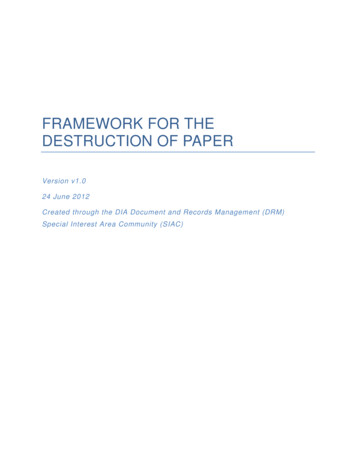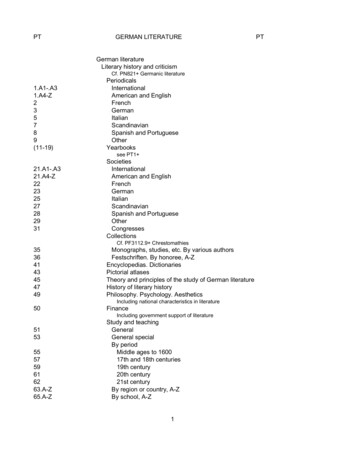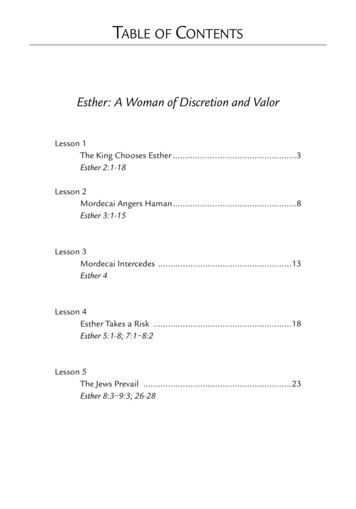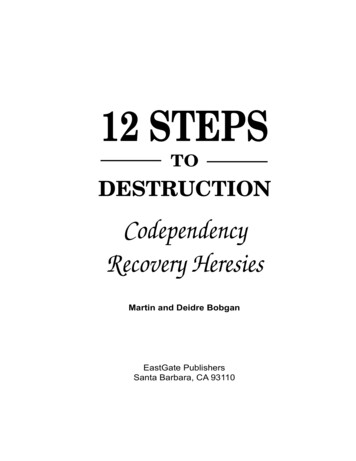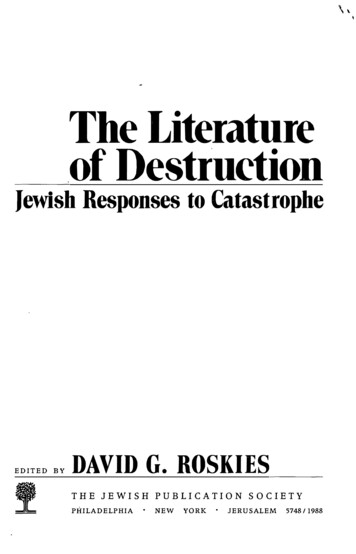
Transcription
The Literatureof DestructionJewish Responses to CatastropheEDITED BY!DAVID G. ROSKIESTHE JEWISH PUBLICATION SOCIETYPHILADELPHIA NEWYORK JERUSALEM5748 / 1988
548 The Literature of Destruction93The Czech Transport: A Chronicleof the Auschwitz SonderhommandoZALMEN GRADOWSKIIntroductionDear reader, I write these words in the moments of my greatest despair. I donot know, I do not believe, that I myself will live to read these lines "after thestorm." Who knows if I will have the good fomme to unfold the secret I carrydeep in my heart to the world? Who knows if I will ever again behold a "free"man and be able to speak with him? It may be that these, the lines that I am nowwriting, will be the sole witnesses to what was my life. But I shall be happy ifonly my writings should reach you, citizen of the free world. Perhaps a spark ofmy inner fire will ignite in you, and even should you sense only part of what welived for, you will be compelled to avenge us-avenge our deaths!Dear discoverer of these writings!I have a request of you: this is the real reason why I write, that my doomedlife may attain some meaning, that my hellish days and hopeless tomorrows mayfind a purpose in the future.I pass on to you only a small part of what took place in the hell of Birkenau Auschwitz. It is for you to comprehend tlre reality. I have written a great dealbesides this. I am certain that you will come upon these remnants, and from themyou will be able to construct a picture of how our people were killed.I also ask a personal favor, dear finder and publisher of these writings. Usingthe address I give here, find out who I am. Then ask my relatives for the portraitof my family, as well as that of my wife and me and, using your discretion, printthem in this book. In this way I hope to immortalize the dear, beloved names ofthose for whom, at this moment, I cannot even expend a tear! For I live in aninferno of death, where it is impossible to measure my great losses. And, of course,I too am c ndemned to die. Can the dead mourn the dead? But you, unknown"free" citizen of the world, I beg you to shed a tear for them when you have theirpictures before your eyes. I dedicate all my writings to them-this is my tear, mylament for my family and people.Here I wish to list the names of my martyred family:My mother-SarahMy sister-LibeMy sister-Esther RokhlMy wife-Sonia (Sarah)My father-in-law-RaphaelMy brother-in-law-WolfThey were killed on December 8, 1942-gassed and incinerated.I also make mention of my father, Shmuel, who was seized on Yorn Kippur1942, and about whom I have heard nothing since. Two brothers, Eber andMoyshl, were captured in Lithuania, my sister Feygeleh in Otwock. This is myentire family.
The Great Lament 549I doubt that any of them are still alive. I ask you-this is my last request-toprint under our photographs the dates on which we were killed.My own fate is evident from the present situation. I know the day approaches the day before which my heart and soul tremble, though not from love of life, forthis life is a torment. Yet, in the moment left me I cannot rest: Live, live for revenge!And immortalize the-names of my loved ones. I have friends in America and inthe Land of Israel. I give the address of one below, and from him you can findout about me and my family.J. Joffe27 East Broadway, N.Y.AmericaEverything described here I experienced myself during my sixteen months ofSonderarbeit, and my accumulated grief and pain, my terrible suffering, could havefound no other expression under these "conditions" than through this writing.The Authorities PrepareCommaru:fer of tlieMen's Camp inAusdi.witz II;exec.utea atNu.rem6er9.Tlieprinteaversion reaas"Fast" or"Fost."Literaffy, specialauty.Josef Scftiffingerwas sfiot inOcto6er 1943; tfiiscefe6rntea case iswicfe[ycfocumentea.Three days earlier, on Monday the sixth of March 1944, the three of themarrived: the Camp Commandant, the cold-blooded murderer Oberscharfiihrer [Jo hann] Schwarzhuber0; the Uberreferat-fiihrer Oberscharfiihrer . ; and our Ob erscharfiihrer Voss,0 the head of all four crematoria. Together they circled the entirearea of the crematorium and devised a "strategic" plan for the military placementof the guards, of the fortified sentinel, on the day of their great celebration.This caused a great stir among us, for it was the first time in our sixteen monthsof harrowing Sonderarbeit0 that the authorities had taken such security precautions.Hundreds of thousands of strong, young people had already passed before oureyes-many in transports of Russians, Poles and Gypsies. They knew they hadbeen brought here to die, but none of them ever tried to revolt or to go downresisting; like sheep to slaughter they passed. There had been only two exceptionsin these sixteen months. A courageous young man from a Bialystok transport hadattacked some guards with knives, wounded several of them severely and wasshot trying to flee. The other exception, before which I bow my head in deeprespect, was the incident of the "Warsaw Transport." This was a group of Jewsfrom Warsaw who had become American citizens, some of them American born.All were to be sent from a German internment camp to Switzerland, where theywould be put under the protection of the Swiss Red Cross; however, the "civilized"authorities brought these American citizens not to Switzerland but to the fires ofthe crematorium. And then something heroic happened: a splendid young woman,a dancer from Warsaw, snatched a revolver from [Walter] Quackemack, the Ob erscharfiihrer of the "Political Section" in Auschwitz and shot the Referat-fiihrer,the notorious Unterscharfiihrer (Josef] Schillinger. 0Her deed bolstered the courage of other brave women, who in tum slappedand threw vials and other such things into the faces of those vicious, uniformedbeasts-the SS.These were the only transports in which people, realizing they had nothingmore to lose, offered resistance. Hundreds of thousands knowingly went to theslaughter like sheep. That was why the current preparations surprised us so. Wefigured that "they" had heard rumors that the Czech Jews, having already spent
550 The Literature of DestructionI.e., in. tlie twincamp of Bimenau.Tfie immedlateseparation tliesexes aiuf tlieweak from tliestr0119 was tlienonn atAuschwitz.ofofseven months in the camp0 with their families and knowing very well what wenton here . . . would not be so submissive. And so they took all the necessaryprecautions against those who would have the "chutzpah" to resist going to theirdeaths, who would dare stage an uprising against their "blameless" transgressors.Monday at noon we were sent into the block to rest, so that we would be ableto approach our work with renewed strength. One hundred and forty men-almostthe entire block (two hundred had already been "removed")-would meet thetransport this day, for both crematoria l and 2 would be operating at full capacity.The plan was executed with the utmost military precision. We, the mostwretched victims of all, were drafted into the camp's ranks against our own sistersand brothers. We had to form the front line, that which the doomed prisonerswould eventually attack, while behind us the "heroes and warriors of the GreatRegime" would stand with automatics, grenades and rifles poised and ready tofire.A day passed, and then a second and a third. Wednesday came, the ultimatedeadline for the transport's arrival. There were two obvious reasons for the delay.First, it appeared that in addition to strategic preparations, moral assurances weredemanded. The other reason was that the "authorities" made special efforts tocarry out their major massacres on Jewish festivals, and so they had planned thisslaughter for Wednesday night, the night of Purim. During those three days, theauthorities-murderers and criminals schooled in bloodshed and cynicism-re sorted to all kinds of deception in order to disguise the true, barbarous nature oftheir masquerade and to confound minds that might otherwise "catch on" andpenetrate the dark machinations behind the "cultured," smiling facade of theregime.And so the swindle began.First, they spread the fiction that the five thousand Czech Jews were to be sentto another "work" camp and had to submit their personal data-all men andwomen under the age of forty, according to trade and profession. The remaining,older people, unseparated by gender, would remain together for the time being,along with women who had young children; families were not to be broken up.This was the first opiate used to stupefy the frightened crowd and blind it to theterrible reality.0The second was that everyone should take his belongings on the journey, andthe authorities, for their part, specially distributed double rations to the departingcrowd.And yet a third sadistic deception was devised. A report was released that, dueto certain circumstances, correspondence to Czechoslovakia would be delayed untilMarch 30; those who wanted to request parcels from friends should postdate theirletters between now and the thirtieth of the month and hand them over to theauthorities, who would send them on and hold the incoming packages until theycould be properly distributed. None of the prisoners could imagine that a "regime"could have become so debased and insidious as to employ such subterfuge. Andagainst whom? Against a defenseless crowd, whose only strength lay in its will,in its bare, unarmed hands.This elaborate swindle was the best means of numbing the minds of the moreclear-thinking and perceptive prisoners. All, regardless of gender or age, let them selves be trapped by the illusion that they were being led to work. Only when
The Great Lament 5 51their deceivers felt that this "chloroform" had taken its full effect did the exter mination process begin.Families were broken up, men separated from women, young from old, and sothey were caught in the trap, led to the nearby, still unoccupied camp. Unsus pecting, the victims were tricked into cold, wooden barracks, each group sepa rately, and the doors were nailed up behind them with boards.The first phase hadsucceeded. People were maddened, perplexed; they could no longer think clearly.When they realized they had been trapped here to die, they lost hope and nolonger possessed the strength to think about struggle and resistance, for everymind-even those that had dispelled all illusion-now faced a new anxiety.Strongyoung boys and girls thought only of their parents.Who knew what was happen ing to them there? And young men, full of courage and strength, sat there stunnedby grief, thinking of the young wives and children from whom they had only justbeen parted. Every outburst of struggle or resistance was immediately over whelmed by individual sorrows.Everyone was bound to his particular misfortune,and this paralyzed any thoughts about the general situation in which he foundhimself. The unshackled, energetic and rebellious crowd sat inert, resigned, shat tered.Unresisting, the five thousand victims took their first step to the grave.This demonic deception, rehearsed so long in advance, had succeeded at last.The ConvogWednesday, March 8, 1944, Purim Night, when those Jews lucky enough tobe in countries that still allowed them to exist went to their synagogues, studyhouses and other places to celebrate the glorious festival of the national, eternalmiracle of Purim and to pray that our new Haman might soon meet his end .On that same night in Auschwitz-Birkenau 140 Jews of the Sonderkommandowere also marching to a certain destination, but not to a synagogue, not with theintention of celebrating the festival and commemorating the Purim miracle.They walked like mourners, with heads sunk deep in sorrow, and the profoundsadness that emanated from them spread to all the Jews in the camp. For the roadon which they marched was the road to the crematorium, to the hell of the Jewishpeople. And soon they would see not a celebration of the Jewish people's pastdelivery from death to life, but festivities of another sort-of a nation of betrayerswho on this night were carrying out the ancient Purim decree, which their godhad revived with still greater brutality.Soon we would bear witness.With our own eyes we would have to watch ourown destruction, as five thousand Jews, five thousand vibrant, thriving souls,women and children, young and old, would pass under the truncheons of civilizedbrutes. At the authorities' disposal would be rifles, grenades and automatics, aswell as their constant four-footed companions, their vicious dogs; these wouldchase and savagely attack the Jews, who, distracted and confused, would runblindly into the arms of death.And we, their own brothers, would have to help with this, help unload themfrom the trucks and lead them to the bunkers, help strip them mother-naked.Andthen, when all was ready, accompany them to the bunker-to the grave.When we came to the site of crematorium 1, the representatives of the regime
552The Literature of Destructionwere already there, spread out along the field. Several SS men were among them,ready for battle, with rifles loaded and grenades at their sides. These well-armedsoldiers completely surrounded the Crematorium, so that if anything were to gowrong they could respond immediately.Cars with searchlights were set up in everycomer to illuminate the battlefield. And there was also a special ammunition truck,in the event that they-should run out of bullets to use against the enemy, themighty one.If you, citizen of the free world, could have seen this, you would have beenstruck with wonder.You would have thought that in that enormous building withthe towering chimneys were giantlike men who could fight like demons, so well armed they must have been. They could have wiped out entire worlds, mightyarmies, in an instant. You would have thought: these men must certainly be greatheroes, preparing to do battle with an enemy that coveted their land, their people,their wealth.Imagine your shock when, after waiting a while, you actually beheld this ter rible enemy, the source of this great hatred, the target of this brutal force.Against whom were they preparing to do battle? Against our people Israel.Soon Jewish mothers would arrive, pressing their babies to their breasts and lead ing the older children by the hand, and they would stare, frightened and helpless,at the chimneys. Vibrant young girls would leap from the trucks and wait for amother or a sister to accompany them to the bunker. And men, too, young andold, fathers and sons, would arrive at this inferno and be driven to their deaths.So this was the great enemy against whom the villain was prepared to conductbattle that ·night. They were afraid, these brutes; perhaps not every one of thethousands of victims would drop like flies, perhaps one would have the courageto take a stand before dying.And it was because of that one, the unknown hero,that they were so afraid and hid behind their civilized guns.All was ready. Seventymen from our squad were also assigned to guard the area of the fenced-in cre matorium. And behind us, outside the fence, they stood with their rifles aimed atthe doomed.Cars and motorcycles raced back and forth.There was much activity to makesure that things were in order. A deathly silence reigned in the camp.Every livingthing must have disappeared, escaped into the wooden graves. The silence wassuddenly disturbed by footsteps. Soldiers in helmets, with weapons loaded,marched by as though they were coming onto a battlefield. Never before hadmilitary personnel entered the camp at night, when everything was sleeping behindthe barbed wires.The camp was prepared for battle.Now every living thing remained motionless, frozen in the cages, even thougheveryone knew that many times, and especially in the recent past, victims hadgone to their deaths in broad daylight, for all to see. Only tonight, out of fear anddread, did the authorities operate in this way. Only the night sky with its starsand bright moon could not be deceived by the devil: They alone would bearwitness to what the devil had carried out.In the silence, the secret silence of the night, trucks were heard approaching.Already they were bringing victims into the camp. Dogs howled ferociously, eagerto attack. Th voices of drunken officers and soldiers rang out.German and Polish prisoners also came, having freely offered to help with the
The Great Lament 5 5 3festivities, and all of them, this gang of devils and the murderers, went to meetthe trucks, load the victims and send them on to the crematorium.The victims were still in the barracks, stifled by the fear of death, their heartspounding. The suspense was maddening as they listened to the activity outsidethe boarded-up doors. Through the crevices they could see the murderers, therobbers who were waiting in trucks to steal their lives. They knew that it couldnot last long, that they would not be allowed to remain even in this dismal place,where they wished they could stay forever. They would be dragged out forciblyand taken somewhere else-to hell.A dreadful trembling suddenly seized the despairing crowd, and they remainedsilent, in paralyzing suspense. Like corpses, they turned to stone in their places.Now, as they heard the approaching footsteps, their hearts stopped beating. Theboard was tom from the door. This board, which had entombed them, had alsoprotected them.As long as it was nailed in place it had set them apart from death,and they had secretly hoped that they could remain in this cage indefinitely-untilthey were freed.And now the door burst open, and the victims, still motionless, nervously eyedtheir brutal oppressors and instinctively drew back, as from a ghost.They wantedto escape to a place where the barbaric eyes could not see them.They were frightened, coming face to face with these who intended to takeaway their lives.But the angry dogs began to howl savagely and threw themselveson the nearest victims, and a club wielded by the hand of a brute-a Pole orGerman--came down on a young Jewish girl. And the crowd, which had clungtogether in a solid mass, poured out of the barracks in single file and graduallybegan to disperse-to fall apart. Hopeless, baffled, crushed, they began to run tothe trucks, dodging the snapping of the dogs and the blows of the enraged brutes.And more than one fleeing woman fell with her child, so that the accursed earthalready drank warm blood from young Jewish skulls.The victims stood on the trucks, waiting to depart, looking around as if forsomething they had lost. It seemed to a young wife that her beloved husbandmight come to her out of nowhere. A mother peered into the tragic night; perhapsher young son would appear. And a girl looked around desperately; perhaps herlover was with the people in the trucks, over there.They looked nervously at the beautiful world, at the sky with the stars and themoon moving majestically within it. They looked at the barracks, the tomb thatthey had just left. If only they could go back! They knew, they sensed that thetruck-this precarious coach-would not hold them for long.Their eyes wanderedover the wires to the camp where they had just been. The frightened Czech familieswere standing there, looking through the crevices at their brothers and sisters whowere.about to be taken away. In the glare of the lights their gazes met.Their heartsbeat rhythmically, full of fear and foreboding. In the night silence hovered thefarewells of the sisters and brothers, the friends and acquaintances who remainedin the camp waiting for the end, to the sisters and brothers, the fathers and mothersabout to be carried in trucks to their deaths.And so the second stage had already succeeded; the devil had brought hisv.ictims to the second step of the grave.
5 54 The Literature of DestructionThey Are HereThey had already arrived, the unfortunate victims. The trucks pulled up. Theirhearts froze as they stood stricken with terror, helpless and despondent, and lookedtoward the building in which their world, their young lives, their vibrant bodies,would soon vanish forever.They could not understand wliat they wanted-all of these officers with theirsilver and gold epaulets, their shining revolvers and grenades hanging at theirsides. And why were they, the victims, standing here like condemned thieves,watched by helmeted soldiers, while from between the trees and wire, gleamingin the light of the moon, the black barrels of rifles pointed at them? For whatpurpose? Why were all the searchlights shining? Was the night too dark? Was themoonlight too faint?They stood baffled, unarmed and resigned. They had already perceived thetruth. The void gaped before their eyes; they were sinking in it already. They feltthat everything, earth, life, fields, trees--everything that lives and exists-was van ishing and sinking with them right into the deep abyss. The stars went out, thesky darkened, the moon stopped shining, the world descended with them. Andthey, the unfortunates, wanted only to sink, to disappear quickly into the abyss.They threw down their parcels--everything they had brought for the "journey."They no longer wanted or needed anything. Passive, unresisting, they let them selves be removed from the trucks and fell, almost fainting, like cut stalks into ourarms. Take me by the hand, brother, and lead me to the stretch of road that is allthat remains of my life. We led them, our dear, beloved sisters; we held themunder their arms, walking quietly step by step, our hearts beating together rhythmi cally. We suffered with them, bled with them, and we felt that each step we tookwas a step away from life, toward death. At the entrance to the sunken bunker,before they took the first step into the grave, they looked for the last time at thesky and the moon-and a moan escaped instinctively from deep in both our hearts.In the moonlight a tear would glisten in the eye of each sister who had been ledhere, and another would form in the eye of the brother who had led her.In the Disrobing RoomIn the center of the deep, vast room flooded by harsh electric light stood twelveposts that supported the weight of the building. Around the posts and against thewalls, benches had been placed with hangers attached for the victims' clothes. Aplacard fixed to the first post stated that this was the entrance to a "bathhouse,"and clothes had to be removed for disinfection.We met them, looked at them with glazed eyes. They knew everything, under stood everything, that this room was not a bathhouse, but the corridor that led tothe grave.The room filled with people. Trucks arrived with fresh victims, and the roomswallowed them all. We stood as if confused, unable to speak to them. Even thoughthis wasn't the first time.We had already received many transports and witnessedmany scenes like this one. But still we felt as weak as if we would faint togetherwith these doomed women.We were stunned. Their clothes, already old and tattered, covered bodies fullof grace and charm. From heads covered with hair-black, brunette, blond, and
The Great Lament 5 5 5even gray-large, deep-set eyes looked bewitchingly at us. We saw before us fresh,lively women, all in their prime and full of vitality, all nurtured from the wellspringof life, like roses growing in the garden, satiated by rainwater and the morningdew. In the brilliant light the teardrops in their flowerlike eyes sparkled like pearls.We didn't have the daring or brashness to tell them, our dear sisters, to stripthemselves naked, for tb-eir clothing was the armor that shielded their lives. Themoment they took off their clothes and stood mother-naked, they would lose theirlast foothold. And therefore it was impossible to tell them to hurry and undress.Let them remain just a moment, just an instant, in their armor, in the mantle oflife.The first question on their lips was if their men had already been there. Eachwanted to know if her husband, father, brother or lover still lived, or if his corpsealready was burning in flames that would leave no trace, and she herself a widowwith an orphaned child. Perhaps she already had lost her father, brother or loverforever. Then why should she remain alive? "Tell me, brother," said one, who inher mind had long ago given up on life and the world forever-she asked franklyand boldly, "Say, brother, how long does it take to die? Is it easy or hard?"They weren't let alone for long. The murderous beasts could not restrain.them selves. The air was tom by the cries of the drunken criminals, who couldn't waitto satisfy their bestial, thirsting eyes with the nakedness of my dear, beautifulsisters. Clubs came down on shoulders and heads, and clothes quickly droppedfrom the bodies. Some of the women were embarrassed, wanted to disappearsomewhere where their nakedness could not be seen. But there was no hidingplace here, no room for shame. Morality and courtesy passed with life into thegrave.A few passionately threw themselves into our arms and asked us with bashfulglances to strip them naked; they wanted to forget everything now, to think ofnothing. They had given up all thought of their previous life, with its moral prin ciples and ethical considerations, when they took the first step into the grave.Now, on the threshold of doom, they thought only about the basic needs of lifeand of the body-the body alone still felt and sensed and desired. They wanted togive it everything, everything, to satisfy the last pleasure that life still offered thebody before its death. And so they wanted their bodies, still pulsing with life'sblood, to be touched, to be fondled by the hands of the strangers, who were theonly ones present to receive their love. And in this way each would feel the handof her lover or husband, stroking and fondling her body consumed by passion.They wanted rapture, my beautiful, beloved sisters, and their burning lips drewlovingly toward us, wanting to kiss passionately, to stay alive.Several new trucks arrived and more victims entered the big room. Many brokefrom the line and fell wildly, weeping and crying; naked children recognized theirmothers and kissed, embraced, rejoiced that they had been reunited here. And achild felt lucky to have a mother, a mother's heart, accompany him to the grave.They all stripped themselves naked and stood straight in the line. Some cried,while others were stonily silent. One tore her hair and talked madly to herself.When I approached her, I heard only the words: "Where are you, my love, whydon't you come to me? I'm certainly young and pretty enough." Those standingnear told me that she had lost her mind in prison the day before.Others spoke to us quietly and calmly: "We're still so young. We want to live,
556 The Literature of Destructionjust a little more life." They weren't pleading with us, for they knew that we werevictims just like themselves.They simply spoke, spoke just like that, because theirhearts were heavy and before they died they wanted to tell their sorrow to thosewho would survive them.A group of women sat embracing and kissing. These were sisters, who had methere and clung together.There a mother sat naked on the bench, holding her daughter, a girl not yetfifteen, on her lap. She pressed her head to her breast and kissed all her limbs.And streaming hot tears fell on the young flower. Thus the mother mourned forher child, whom she would soon lead to death with her own hand.More light now poured into the room, into the giant grave. On one side of thishell the women were now lined up, their white bodies waiting, waiting for thedoors to open and admit them to the grave. We the men, still dressed, stoodopposite them and motionlessly looked on. We could no longer grasp if this scenewas real or only a dream.Had we fallen into a world of naked women who weresoon to be the victims of a demonic game? Or had we fallen into a museum orartist's studio where these women, of different ages and with faces contorted inevery way, weeping softly and moaning, had been brought specifically to serve asmodels for the artist?For we wondered why they, unlike many other transports, were on the wholeso calm, many even brave and carefree, as though nothing could happen to them.They faced death so heroically, so calmly, that we were deeply moved and sur prised. Could it be that they didn't know what awaited them? We regarded themwith pity, because already there came to us a new, dreadful realization of how allthese vibrant souls, even the noise and chatter that rose from them, would in afew hours be stilled by death, their mouths silenced forever. The sparkling eyes,now so bewitching, would gaze fixedly in one direction-seeking something inthe deadness of eternity.These same women who now pulsed with life would lie in dirt and filth, theirpure white bodies smeared with human excrement.From the pearly mouths-teeth and flesh would be tom out together and bloodwould flow.From the noses, so finely shaped-two streams would trickle, red, yellow andwhite.And the faces, white and pink, would tum red, blue and black from the gas.The eyes would fill with blood, so that it would be impossible to know if this wasthe same face we were looking at now. The head, now covered with wavy hair,would be shaven by cold hands, and ears and fingers would be stripped of theirearrings and their rings.And then two strangers would pull on gloves or lay stripson their hands, because the snow-white figure, so dazzling now, would by thenbe so repulsive that they would not want to touch her with bare hands. Theywould drag her-this same beautiful young flower-across the cold, filthy cementfloor, and the body, after sweeping all the dirt in its path, would be flung asidelike a carcass, to be lifted by pulley to the inferno above and fed to the fire thatin minutes would reduce it to ashes.Already we saw their inevitable end. I watched them, these vibrant souls whofilled such an enormous
My wife-Sonia (Sarah) My father-in-law-Raphael My brother-in-law-Wolf . They were killed on December 8, 1942-gassed and incinerated. I also make mention of my father, Shmuel, who was seized on Yorn Kippur 1942, and about whom I have heard nothing since. Two brothers, Eber and Moyshl, were captured in Lit


